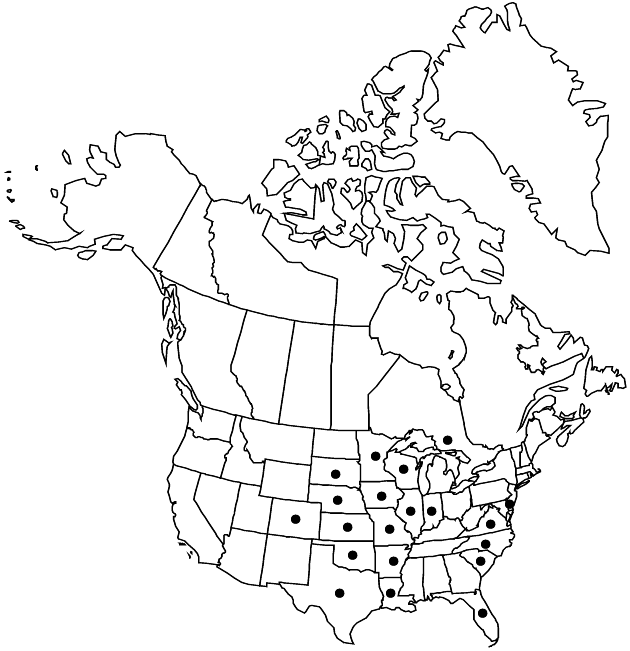Difference between revisions of "Euthamia gymnospermoides"
Pittonia 5: 75. 1902.
FNA>Volume Importer |
imported>Volume Importer |
||
| (6 intermediate revisions by 2 users not shown) | |||
| Line 8: | Line 8: | ||
}} | }} | ||
|common_names=Great Plains goldentop | |common_names=Great Plains goldentop | ||
| + | |special_status={{Treatment/ID/Special_status | ||
| + | |code=E | ||
| + | |label=Endemic | ||
| + | }} | ||
|basionyms= | |basionyms= | ||
|synonyms={{Treatment/ID/Synonym | |synonyms={{Treatment/ID/Synonym | ||
|name=Euthamia camporum | |name=Euthamia camporum | ||
|authority=Greene | |authority=Greene | ||
| − | }}{{Treatment/ID/Synonym | + | |rank=species |
| + | }} {{Treatment/ID/Synonym | ||
|name=Euthamia chrysothamnoides | |name=Euthamia chrysothamnoides | ||
|authority=Greene | |authority=Greene | ||
| − | }}{{Treatment/ID/Synonym | + | |rank=species |
| + | }} {{Treatment/ID/Synonym | ||
|name=Euthamia glutinosa | |name=Euthamia glutinosa | ||
|authority=Rydberg | |authority=Rydberg | ||
| − | }}{{Treatment/ID/Synonym | + | |rank=species |
| + | }} {{Treatment/ID/Synonym | ||
|name=Euthamia pulverulenta | |name=Euthamia pulverulenta | ||
|authority=Greene | |authority=Greene | ||
| − | }}{{Treatment/ID/Synonym | + | |rank=species |
| + | }} {{Treatment/ID/Synonym | ||
|name=Solidago gymnospermoides var. callosa | |name=Solidago gymnospermoides var. callosa | ||
|authority=Harris | |authority=Harris | ||
| − | }}{{Treatment/ID/Synonym | + | |rank=variety |
| + | }} {{Treatment/ID/Synonym | ||
|name=Solidago texensis | |name=Solidago texensis | ||
|authority=Friesner | |authority=Friesner | ||
| + | |rank=species | ||
}} | }} | ||
|hierarchy=Asteraceae;Asteraceae tribe Astereae;Euthamia;Euthamia gymnospermoides | |hierarchy=Asteraceae;Asteraceae tribe Astereae;Euthamia;Euthamia gymnospermoides | ||
| Line 42: | Line 52: | ||
|elevation=0–200 m | |elevation=0–200 m | ||
|distribution=Ont.;Ark.;Colo.;Del.;Fla.;Ill.;Ind.;Iowa;Kans.;La.;Minn.;Mo.;Nebr.;N.C.;Okla.;S.C.;S.Dak.;Tex.;Va.;Wis. | |distribution=Ont.;Ark.;Colo.;Del.;Fla.;Ill.;Ind.;Iowa;Kans.;La.;Minn.;Mo.;Nebr.;N.C.;Okla.;S.C.;S.Dak.;Tex.;Va.;Wis. | ||
| − | |discussion=<p>Some plants from the southern Great Lakes area with tendencies to shorter involucres and narrower leaves, called Euthamia gymnospermoides by H. A. Gleason and A. Cronquist (1991) and D. J. Sieren (1981), are better included in E. caroliniana.</p> | + | |discussion=<p>Some plants from the southern Great Lakes area with tendencies to shorter involucres and narrower leaves, called <i>Euthamia gymnospermoides</i> by H. A. Gleason and A. Cronquist (1991) and D. J. Sieren (1981), are better included in <i>E. caroliniana</i>.</p> |
|tables= | |tables= | ||
|references= | |references= | ||
| Line 51: | Line 61: | ||
-->{{#Taxon: | -->{{#Taxon: | ||
name=Euthamia gymnospermoides | name=Euthamia gymnospermoides | ||
| − | |||
|authority=Greene | |authority=Greene | ||
|rank=species | |rank=species | ||
| Line 65: | Line 74: | ||
|publication title=Pittonia | |publication title=Pittonia | ||
|publication year=1902 | |publication year=1902 | ||
| − | |special status= | + | |special status=Endemic |
| − | |source xml=https:// | + | |source xml=https://bitbucket.org/aafc-mbb/fna-data-curation/src/2e0870ddd59836b60bcf96646a41e87ea5a5943a/coarse_grained_fna_xml/V19-20-21/V20_193.xml |
|tribe=Asteraceae tribe Astereae | |tribe=Asteraceae tribe Astereae | ||
|genus=Euthamia | |genus=Euthamia | ||
Latest revision as of 21:01, 5 November 2020
Perennials or subshrubs, 40–150 cm. Stems (simple or branched) glabrous or with scabrous lines, not glaucous. Leaves usually ascending; blades (1–)3- or -5-nerved, linear to lanceolate, 40–100(–120) × 1.4–4(–8) mm, lengths 12–49 time widths, gradually reduced distally, firm-herbaceous, margins scabrous, apices acuminate, faces abundantly and prominently gland-dotted (29–49 dots per mm²), glabrous or midveins with hairs. Heads (some or all) pedunculate (rarely all glomerate), usually in flat-topped to slightly rounded, arrays (25–)35–60% of plant heights. Involucres obconic, (4–)4.5–6.2 mm. Phyllaries usually green-tipped, outer ovate, inner linear-oblong, apices obtuse to acute (± strongly resinous). Ray florets 9–13(–16). Disc florets 3–9; corollas (3–)3.3–4.8 mm. 2n = 36, 54.
Phenology: Flowering Aug–Sep.
Habitat: Open, dry to moist, sandy areas
Elevation: 0–200 m
Distribution

Ont., Ark., Colo., Del., Fla., Ill., Ind., Iowa, Kans., La., Minn., Mo., Nebr., N.C., Okla., S.C., S.Dak., Tex., Va., Wis.
Discussion
Some plants from the southern Great Lakes area with tendencies to shorter involucres and narrower leaves, called Euthamia gymnospermoides by H. A. Gleason and A. Cronquist (1991) and D. J. Sieren (1981), are better included in E. caroliniana.
Selected References
None.